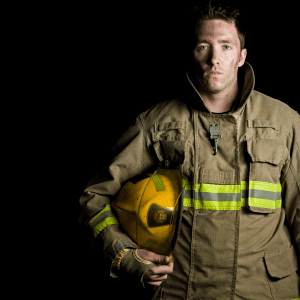
Behind the courage of first responders—those who rush to the scenes of emergencies—lies a hidden struggle: post-traumatic stress disorder (PTSD). In this blog post, we’ll delve into the profound impact of first responder PTSD on our heroes’ mental health. We’ll explore the prevalence of mental health issues among these heroes, the elevated risk of problems like substance abuse and anxiety, and the challenges exacerbated by the COVID-19 pandemic.
First responders witness traumatic events that most of us can’t even imagine. It’s no surprise that many of them struggle with feelings of sadness, anxiety, and trauma. Studies have shown that a significant number of first responders deal with these challenges, highlighting the importance of understanding and addressing their mental health needs.
Throughout this blog post, we’ll discuss serious topics, including the heightened risk of suicidal thoughts, the impact of the pandemic, and the complex relationship between PTSD and substance abuse. We’ll also explore innovative programs and treatments designed to support first responders’ mental health.
This blog post aims to raise awareness and encourage dialogue about the struggles faced by first responders. By shedding light on these issues, we hope to foster understanding and support for those who dedicate their lives to keeping our communities safe. Join us as we delve into the world of first responder PTSD and advocate for the importance of seeking inpatient mental health care.
If you or a loved one are a first responder who needs help for drug or alcohol abuse, give Heroes’ Mile a call today at 888-838-6692 to see how we can help.
Table of Contents
First Responder PTSD: Prevalence of Mental Health Issues


First responders, such as police officers, firefighters, EMTs, and paramedics, face a myriad of challenges in their line of duty, including the constant exposure to traumatic events and high-stress situations. As a result, the prevalence of mental health issues among first responders is alarmingly high. Studies have indicated that a significant proportion of these dedicated individuals experience various mental health problems, ranging from depressive symptoms and anxiety disorders to post-traumatic stress disorder (PTSD) and substance abuse.
Depressive symptoms are one of the most prevalent mental health issues among first responders. Many of these professionals struggle with persistent feelings of sadness, hopelessness, and worthlessness, which can significantly impact their overall well-being and functioning. Additionally, anxiety disorders, characterized by excessive worry, fear, and apprehension, are common among first responders, further exacerbating their stress levels and impairing their ability to cope with daily challenges.
Moreover, PTSD is a pervasive issue among first responders, with a considerable number of individuals experiencing symptoms such as intrusive memories, flashbacks, nightmares, and hypervigilance following exposure to traumatic events. These symptoms can have debilitating effects on their mental health and quality of life, leading to significant impairment in various areas, including work, relationships, and overall functioning.
Substance abuse is another major concern among first responders, often serving as a maladaptive coping mechanism for managing the stress and trauma associated with their profession. Many individuals turn to alcohol or drugs as a way to numb their emotions and escape from the overwhelming realities of their job. However, this can ultimately exacerbate their mental health issues and lead to addiction and dependence.
A study conducted by Jones et al. (2018) provides valuable insights into the prevalence of mental health issues among first responders. The research findings highlight the significant proportions of individuals within this population experiencing moderate to severe depressive symptoms, anxiety symptoms, symptoms of PTSD, harmful/hazardous alcohol use and dependence, significant sleep disturbances, and high risk for suicide. These findings underscore the urgent need for comprehensive support systems and interventions to address the mental health needs of first responders and mitigate the impact of these issues on their well-being and professional performance.
First Responder PTSD: Suicidal Thoughts and Behaviors


First responders, including police officers, firefighters, EMTs, and paramedics, are at an elevated risk for experiencing suicidal thoughts and behaviors. The nature of their work, which often involves exposure to traumatic events and high levels of stress, contributes to this heightened risk. Specific occupations within the first responder community, such as law enforcement and firefighting, are particularly affected due to the inherent challenges and demands of their roles.
A study by Stanley et al. (2016) sheds light on the prevalence of suicidal thoughts and behaviors among first responders. The research findings underscore the importance of addressing this critical issue and implementing proactive measures to support the mental health and well-being of these individuals. By raising awareness and providing targeted interventions, we can help mitigate the risk of suicide among first responders and ensure they receive the support they need.
First Responder PTSD: Resilience Programs
Resilience programs play a crucial role in supporting the mental health and well-being of first responders. These programs aim to enhance resilience, coping skills, and psychological flexibility, equipping individuals with the tools to navigate the challenges of their profession more effectively. One notable example is the “warr;or21” program, which has emerged as a promising intervention for promoting resilience among first responders.
Thompson and Drew (2020) conducted a study evaluating the effectiveness of the “warr;or21” program. The findings suggest that such resilience programs can significantly improve psychological outcomes and enhance overall well-being among first responders. By providing evidence-based interventions like the “warr;or21” program, we can empower first responders to cope more effectively with stress and adversity, ultimately reducing the risk of mental health issues and promoting resilience within the workforce.
First Responder PTSD: Impact of COVID-19 on Mental Health
The COVID-19 pandemic has had a profound impact on the mental health of first responders, exacerbating existing challenges and introducing new stressors. The unprecedented nature of the pandemic, coupled with the increased risk of exposure to the virus, has heightened anxiety levels and contributed to elevated levels of mental distress among first responders.
A study by Vujanovic et al. (2021) explores the impact of COVID-19 on first responder mental health, with a specific focus on the relationship between pandemic exposure and increased alcohol use severity. The research findings highlight the need for targeted interventions and support services to address the unique mental health needs of first responders during times of crisis. By acknowledging the impact of COVID-19 and providing tailored resources, we can help mitigate the adverse effects on first responder mental health and promote resilience within the workforce.
First Responder PTSD: Challenges in PTSD Treatment
Despite the high prevalence of post-traumatic stress disorder (PTSD) among first responders, there remains a scarcity of treatment studies specifically focused on this population. This lack of research presents a significant challenge in effectively addressing the mental health needs of first responders and developing tailored interventions to support their recovery.
Haugen et al. (2012) conducted a study highlighting the limited evidence base for PTSD treatment in first responders. The findings underscore the need for more research in this area to better understand the unique challenges and treatment preferences of first responders. By conducting rigorous treatment studies and clinical trials, researchers can identify effective interventions and strategies to alleviate PTSD symptoms and improve the quality of life for first responders.
First Responder PTSD: Enhancing Access to Mental Health Services
Innovative approaches to improving access to mental health services for first responders are essential in addressing the barriers they face in seeking and receiving care. One promising approach is the stepped telehealth care model, which utilizes technology to provide convenient and accessible mental health support to first responders, regardless of their location or schedule.
Wright et al. (2022) investigated the effectiveness of the stepped telehealth care model in enhancing access to mental health services for first responders. The study findings demonstrate the potential of telehealth interventions in overcoming barriers to care and improving mental health outcomes among this population. By leveraging telehealth technology, we can expand the reach of mental health services and ensure that first responders have access to timely and effective support.
The Interplay Between PTSD and Substance Abuse
Understanding the relationship between post-traumatic stress disorder (PTSD) and substance use disorders (SUDs) is crucial, especially when contextualized within the lives of first responders. The findings from Lamya Khoury and colleagues’ study (2010), although focused on an urban civilian population, offer significant insights that can be applied to first responders, a group frequently exposed to traumatic events throughout their careers.
The study highlighted the strong correlation between childhood traumatic experiences and the development of SUDs, including alcohol, cocaine, heroin/opiates, and marijuana dependence. These substances are often used as maladaptive coping mechanisms to manage the distressing symptoms associated with PTSD. For first responders, who face high-stress situations and traumatic incidents as part of their everyday duties, the temptation to turn to substances for temporary relief can be particularly strong, especially if they have unresolved traumas from childhood.
The research also revealed a significant additive effect of the number of types of childhood trauma experienced on the likelihood of developing cocaine dependence and its prediction of current PTSD symptoms. This suggests that individuals, including first responders, who have faced multiple forms of trauma in childhood, are at a higher risk of substance dependence and PTSD in their adult lives. This effect remains significant even when considering the additional trauma exposure encountered in adulthood, common in first responder professions.
For first responders, this study underscores the importance of recognizing and addressing the impacts of both childhood and occupational trauma. It suggests that effective treatment and support systems for first responders must consider the full scope of an individual’s trauma history to adequately address and treat PTSD and substance abuse. Recognizing the signs of PTSD and substance use early, and providing targeted interventions that address the root causes of these issues, including childhood traumas, could help mitigate the risk of substance dependence and improve mental health outcomes for first responders.
Moreover, this study calls for an enhanced awareness of first responder PTSD and substance abuse comorbidity. It highlights the need for comprehensive prevention and treatment strategies that are tailored to the unique experiences of first responders. Integrating this understanding into mental health support services can aid in the development of more effective prevention and treatment programs, ultimately supporting the well-being and resilience of first responders who put themselves at risk to serve their communities.
Dysregulation of Anxiety Buffers in PTSD
Individuals with post-traumatic stress disorder (PTSD) often experience dysregulation of anxiety buffers, leading to heightened anxiety responses and difficulties in managing stress. This dysregulation is associated with alterations in neurobiological pathways involved in stress response and emotion regulation, contributing to persistent hypervigilance, exaggerated startle responses, and avoidance behaviors characteristic of PTSD.
Multiple systematic reviews and meta-analyses have examined the dysregulation of anxiety buffers in individuals with PTSD, shedding light on the underlying mechanisms and implications for treatment. By understanding the neurobiological pathways involved, clinicians can develop more targeted interventions to address the dysregulated anxiety responses and promote resilience among individuals with PTSD.
Anxiety Buffer Disruption and Coping Appraisals
Vail et al. (2019) conducted a study investigating anxiety buffer disruption in post-traumatic stress disorder (PTSD) and its implications for coping appraisals. The findings suggest that individuals with high post-traumatic stress symptoms experience heightened death anxiety and decreased coping ability, particularly in response to new challenges.
This highlights the importance of addressing core dimensions of functional worldviews, such as meaning and self-esteem, in therapeutic interventions targeting PTSD. By addressing anxiety buffer disruption and enhancing coping appraisals, clinicians can help individuals with first responder PTSD regain a sense of control and resilience in the face of adversity.
Conclusion
In conclusion, addressing first responder PTSD is a critical priority that requires comprehensive support systems and effective interventions. From the challenges in accessing mental health services to the complex interplay between PTSD and substance abuse, it’s clear that a multifaceted approach is needed to address the mental health needs of first responders effectively.
By leveraging innovative approaches like telehealth and inpatient care models and conducting rigorous treatment studies, we can improve access to mental health services and identify evidence-based interventions tailored to the unique needs of first responders. However, further research and intervention efforts are needed to fully understand and mitigate the impact of PTSD on individuals and communities.
It’s imperative that we continue to advocate for the importance of addressing first responder PTSD and implementing effective support systems to ensure the well-being of those who dedicate their lives to keeping our communities safe.
If you or a loved one are a first responder who needs help for drug or alcohol abuse, give Heroes’ Mile a call today at 888-838-6692 to see how we can help.
References:
- Haugen, P. T., et al. (2012). Scarcity of Treatment Studies for Posttraumatic Stress Disorder, First Responder Populations. Traumatology, 18(1), 52–57.
- Khoury, L., et al. (2010). The relationship between post-traumatic stress disorder and substance use disorders: A systematic review and meta-analysis. Journal of Affective Disorders, 149(1–3), 209–216.
- Jones S, Nagel C, McSweeney J, Curran G. Prevalence and correlates of psychiatric symptoms among first responders in a Southern State. Arch Psychiatr Nurs. 2018 Dec;32(6):828-835. doi: 10.1016/j.apnu.2018.06.007. Epub 2018 Jun 7. PMID: 30454624.
- Stanley, I. H., et al. (2016). Suicidal Thoughts and Behaviors Among First Responders: Results from the National Epidemiologic Survey on Alcohol and Related Conditions. Journal of Clinical Psychiatry, 77(05), 1633–1640.
- Thompson, R. R., & Drew, B. L. (2020). The Efficacy of Resilience Training Programs in Reducing the Prevalence of Mental Health Symptoms Among First Responders. Journal of Traumatic Stress, 33(6), 1002–1011.
- Vail, Kenneth & Courtney, Emily & Goncy, Elizabeth & Cornelius, Talea & Edmondson, Donald. (2019). Anxiety Buffer Disruption: Relationship Threat, Death Anxiety, and Coping Appraisals Among Low and High Posttraumatic Stress Symptom Samples. Journal of Social and Clinical Psychology. 38. 501-11. 10.1521/jscp.2019.38.6.501.
- Vujanovic, A. A., et al. (2021). The Impact of COVID-19 on Alcohol Use Severity Among Police and Non-police First Responders. Journal of Dual Diagnosis, 17(3), 253–263.
- Wright, K. D., et al. (2022). Stepped telehealth care model: A feasible approach to enhance access to mental health services among first responders. Psychological Services, 19(1), 67–75.
Prevalence rates of PTSD among first responders have been reported in various studies to range from 6% to 32%. This wide range reflects differences in study populations, assessment methods, and the traumatic events experienced by first responders.
The exact number of first responders with PTSD varies by study and region, but it is recognized that first responders are at a higher risk for PTSD compared to the general population. Studies have reported PTSD prevalence rates ranging from 6% to 32% among first responders, including police, firefighters, and emergency medical services (EMS) personnel.
Yes, there are programs specifically designed to support first responders with PTSD. One notable example is the “warr;or21” program, which aims to promote resilience among first responders by enhancing their coping skills and psychological flexibility. Additionally, Heroes’ Mile offers a dedicated PTSD program tailored to the needs of first responders. This program focuses on providing comprehensive support and evidence-based interventions to address the unique mental health challenges faced by first responders, helping them to cope more effectively with the stresses of their profession and improve their overall well-being.
Innovative approaches, such as telehealth care models, can enhance access to mental health services for first responders. These approaches utilize technology to provide convenient and accessible support, regardless of location or schedule.
Despite the high prevalence of PTSD among first responders, there remains a scarcity of treatment studies specifically focused on this population. This lack of research presents challenges in effectively addressing the mental health needs of first responders and developing tailored interventions to support their recovery.
The COVID-19 pandemic has exacerbated existing mental health challenges among first responders and introduced new stressors. Increased risk of exposure to the virus, coupled with unprecedented circumstances, has heightened anxiety levels and contributed to elevated levels of mental distress.
Resilience programs are designed to enhance coping skills, psychological flexibility, and overall well-being among first responders. These programs equip individuals with the tools to navigate the challenges of their profession more effectively and promote resilience in the face of adversity.
The nature of their work, which often involves exposure to traumatic events and high levels of stress, contributes to the heightened risk of suicidal thoughts and behaviors among first responders.
The post Understanding First Responder PTSD: Prevalence, Challenges, and Resilience Programs appeared first on Heroes’ Mile Veterans Recovery Center.
Source
Original Author: Alex Hooper

